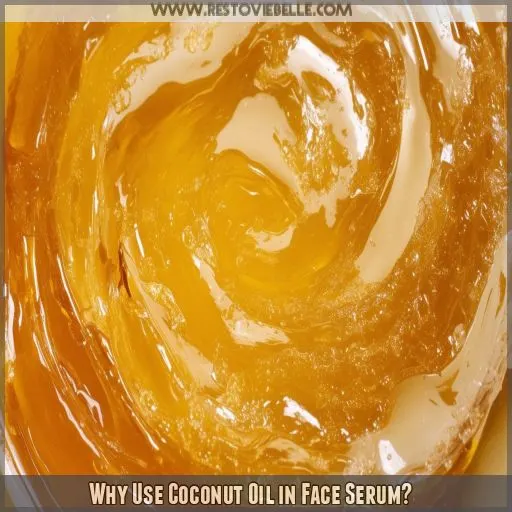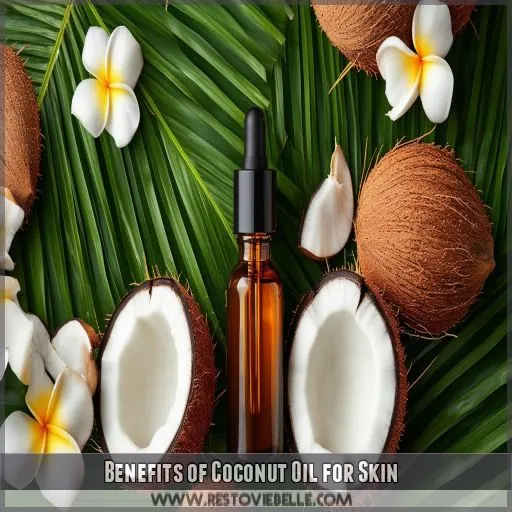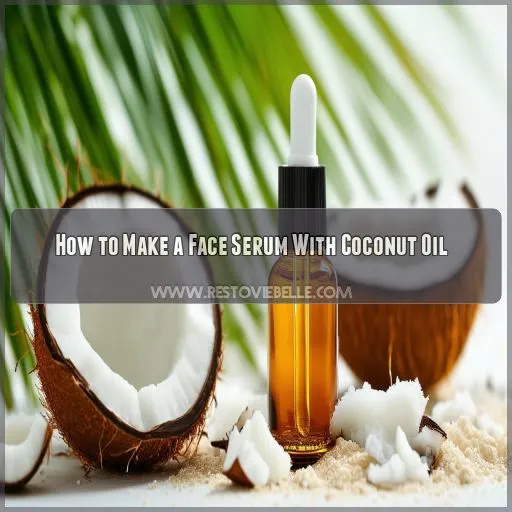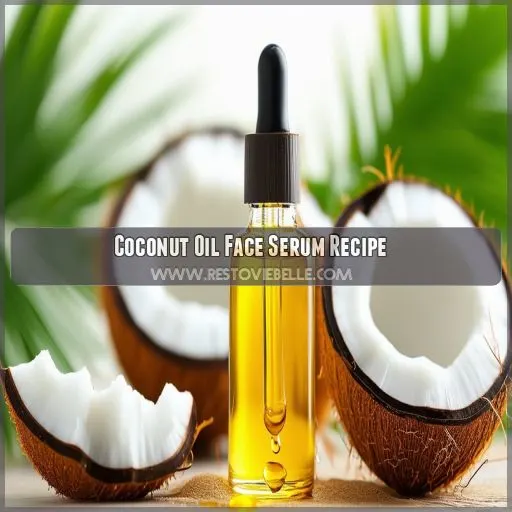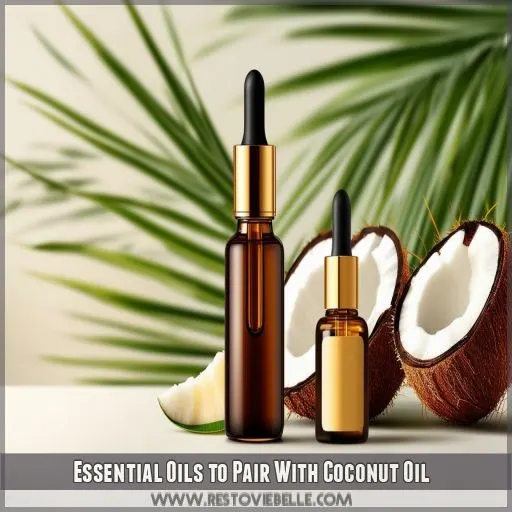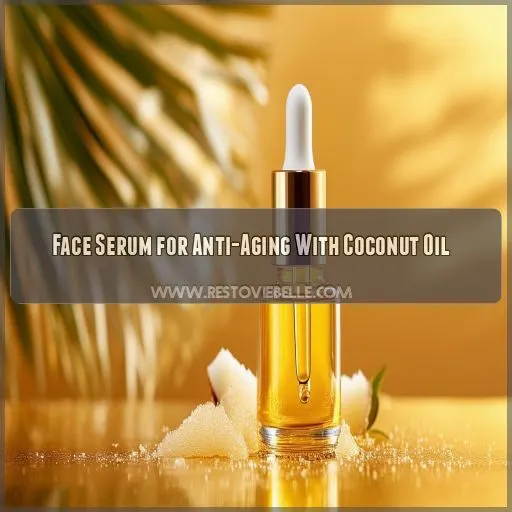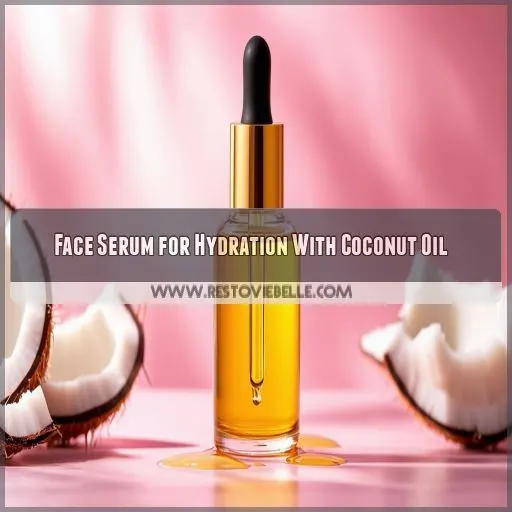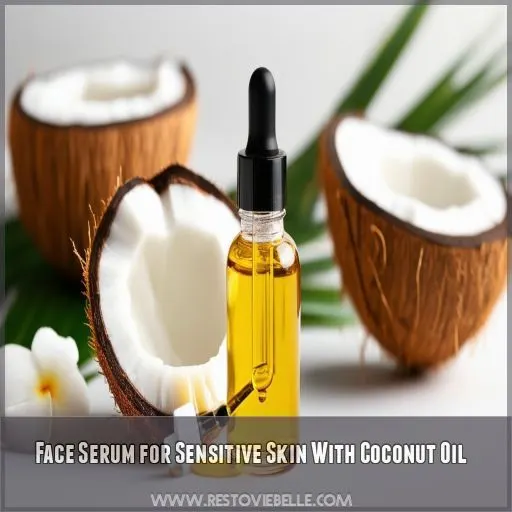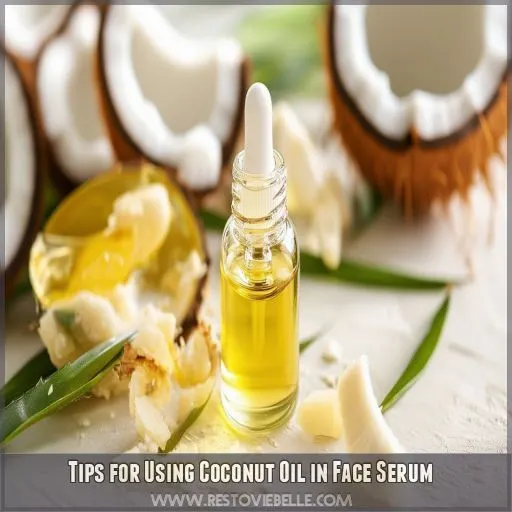This site is supported by our readers. We may earn a commission, at no cost to you, if you purchase through links.
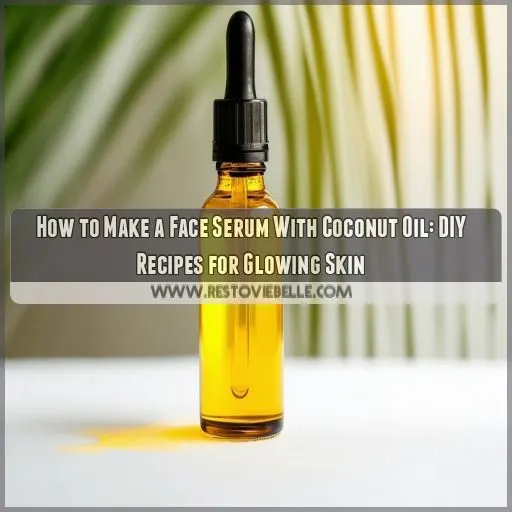 Unlock the secrets of glowing skin by whipping up a face serum with coconut oil.
Unlock the secrets of glowing skin by whipping up a face serum with coconut oil.
Learn how to put coconut oil’s moisturizing, antioxidant, and healing properties into play as you concoct a rejuvenating and revitalizing serum.
Get inside this book for easy recipes backed by research on how to blend it with essential oils, working wonders on anti-aging, hydration, clear skin, and sensitive skin.
Now, dive right in—Innovate and create skincare mastery from the comfort of your own home.
Table Of Contents
- Key Takeaways
- How Do You Make a Face Serum With Coconut Oil?
- Why Use Coconut Oil in Face Serum?
- Benefits of Coconut Oil for Skin
- How to Make a Face Serum With Coconut Oil
- Coconut Oil Face Serum Recipe
- Essential Oils to Pair With Coconut Oil
- Face Serum for Anti-Aging With Coconut Oil
- Face Serum for Hydration With Coconut Oil
- Face Serum for Clear Skin With Coconut Oil
- Face Serum for Sensitive Skin With Coconut Oil
- Tips for Using Coconut Oil in Face Serum
- Frequently Asked Questions (FAQs)
- What is the best homemade face serum?
- How do you make homemade face oil serum?
- How to make your own anti-aging serum?
- Does coconut oil work as serum?
- Should you use coconut oil to make a DIY facial serum?
- Is coconut oil good for hair and skin?
- How to make a DIY essential oil face serum?
- How do you make a homemade face serum?
- Can coconut oil cause acne breakouts?
- Is coconut oil safe for oily skin?
- How to store face serum properly?
- What are non-comedogenic alternatives to coconut oil?
- Are there any side effects of coconut oil?
- Conclusion
Key Takeaways
- Coconut oil is a skin-loving ingredient that can moisturize, reduce inflammation, and fight bacteria.
- Making your own face serum with coconut oil is easy and affordable, and you can customize it to your specific skin needs.
- Essential oils can be added to your serum to boost its benefits, such as lavender for calming, frankincense for anti-aging, or tea tree oil for clear skin.
- Remember to dilute your essential oils with a carrier oil, such as coconut oil, to avoid skin irritation.
How Do You Make a Face Serum With Coconut Oil?
To make a face serum with coconut oil, blend 1 tablespoon of fractionated coconut oil with a few drops each of Vitamin A and E oils as your carrier base.
Add essential oils like lavender, frankincense, and tea tree for extra benefits.
Mix the oils well in a small bottle and store it in a cool, dark place.
Coconut oil deeply moisturizes, offers antioxidant protection, and heals your skin, making it an excellent addition to your skincare routine.
Ready to discover more about crafting your ideal face serum? Keep going—you’re on the right track!
Why Use Coconut Oil in Face Serum?
.Face serum mixed with coconut oil imparts various benefits, the primary one being moisturizing effects. Of the fractions, fractionated coconut oil has the advantage of not solidifying at room temperature and, therefore, is a perfect carrier oil. It’s much more tolerated by sensitive skin because it irritates less and clogs the pores less than whole coconut oil.
This, furthermore, will increase the overall effectiveness of the serum since coconut oil will be mixed with other enhanceable oils, such as Vitamin E oil, which is an antioxidant. The blend helps in hydration and healthiness of the skin. When you go for a DIY face serum, you have control over ingredients so that it fosters a natural and tailored skincare routine for a glowing complexion. Mixing this with other carriers, such as sweet almond or grapeseed oil, allows for further customization of the serum to suit your specific skin needs for a perfectly balanced and glowing complexion.
Benefits of Coconut Oil for Skin
Coconut oil offers impressive moisturizing properties, making it excellent for maintaining skin hydration. Additionally, its antioxidant benefits and healing abilities can help protect and repair your skin.
Moisturizing Properties
Coconut oil’s moisturizing properties make it an excellent choice for your natural face serum. Its lightweight, non-greasy texture absorbs quickly, leaving your skin feeling soft and supple. Pair it with other nourishing carrier oils like jojoba, almond, or avocado for a hydrating skincare routine.
- Deeply moisturizes
- Absorbs quickly
- Non-greasy texture
- Softens skin
Antioxidant Benefits
Coconut oil provides antioxidant protection, combating free radical damage that can lead to premature aging. Its rich content, including vitamin E oil, helps in skin repair and prevents cellular damage. Combining it with jojoba oil, rosehip oil, pomegranate seed oil, or argan oil boosts these benefits further.
Healing Abilities
Coconut oil’s healing abilities shine through its anti-inflammatory effects and antibacterial properties. It’s excellent for healing wounds and reducing redness, making it perfect for sensitive skin. When blended with essential oils in your homemade serum, fractionated coconut oil acts as a natural moisturizer, enhancing overall skin health with proper dilution rates.
How to Make a Face Serum With Coconut Oil
You know by now the benefits of coconut oil for your skin; let’s get straight to making up your face serum. Making a face serum with coconut oil is pretty straightforward. You’ll need just a few ingredients to create a compelling blend that will work magic on your skin type.
Blend Carriers: Compose a blend of carries with 1 teaspoon of Vitamin A oil, Vitamin E oil, and fractionated coconut oil into a 2 oz glass dropper bottle.
- Add essential oils: These include essential oil blends such as lavender for skin-soothing, frankincense for anti-aging, or tea tree oil for clear skin.
• Mix and store: Pour the oils into the bottle with a funnel, shake well, then store in a cool, dark place.
In this case, create a DIY face oil serum with coconut oil to nourish your skin by moisturizing it, reducing fine lines on the face, and giving you that radiant glow.
Coconut Oil Face Serum Recipe
Ready to whip up your own face serum using coconut oil? Here’s a simple recipe to get you started:
Start by gathering your ingredients. In a 2 oz glass dropper bottle, add 1 teaspoon each of Vitamin A oil, Vitamin E oil, and fractionated coconut oil. Next, choose an additional carrier oil suitable for your skin type; sweet almond oil works well for most, while grapeseed oil is great for oily skin. Add one more teaspoon of your preferred carrier oil.
For maximum benefits, you’ll want to add essential oils too. Target precise skin concerns while keeping the concentration low—100 drops total is ideal. Shake the bottle well. Use a liquid funnel to avoid spilling.
Apply 5-7 drops to your palms, then gently massage into your cleansed, dry face. Voilà! You’re now on the path to natural, glowing skin with your DIY skincare creation.
Essential Oils to Pair With Coconut Oil
Mix coconut oil with these essential oils to create a face serum that gives even more benefits due to the best formulation for your skin type. Here are three blends of oils that go very well with coconut oil to address different needs:
- Oily Skin: Mix Coconut Oil with Geranium Essential Oil, Ylang-Ylang Essential Oil, and Lavender Essential Oil. The oils regulate the production of oils in the body, reduce acne, and act as an anti-inflammatory balm.
- Dry Skin: Coconut oil blended with lavender, frankincense, and myrrh will hydrate, support healing, and soothe.
- Sensitive Skin: Coconut oil along with chamomile, helichrysum, and geranium can be used. All these oils are gentle, cutting down the irritation in redness while promoting the rejuvenation of skin en masse.
It is important to is well diluted and suited to your skin type. A rough guide is to combine 1-3% essential oils with the carrier oil. Always patch test for sensitivity and adjust the ratio of oil blends as needed. Get ready to love the difference coconut and essential oils can bring about in your skincare!
Face Serum for Anti-Aging With Coconut Oil
Now, after learning about the best pairing of essential oils with coconut oil, let’s make an anti-aging face serum. Coconut oil is a beautiful moisturizer and antioxidant base for fighting wrinkles or bringing forth glowing skin. Adding some concentrated targeted essential oils into this blend makes it magic for natural skin care.
| Essential Oil | Benefits |
|---|---|
| Rose | Reduces fine lines |
| Myrrh | Promotes skin renewal |
Helichrysum Heals and rejuvenates
In a dropper bottle, mix equal parts coconut and rosehip oil. Then, add ten drops of rose essential oil, myrrh essential oil, helichrysum essential oil, yarrow essential oil, and lavender essential oil. Shake well and apply 5-7 drops to your face twice daily for youthful skin that shines from within.
Face Serum for Hydration With Coconut Oil
For dry skin, a facial serum comprising coconut oil can be very beneficial regarding hydration. It’s a known moisturizer with excellent properties for locking moisture into the skin by erecting a protective barrier. Mix one teaspoon of coconut oil, rich in vitamin E, with one teaspoon of sweet almond oil to develop a hydrating glow serum. This blend nourishes and thoroughly hydrates.
Add 100 drops of skin-supporting oils, like lavender and frankincense, for added benefits with acne scarring and hyperpigmentation. The serum doesn’t just lighten the dark spots; it leaves rejuvenated softness on your skin.
Add coconut oil to your face serum and save some money, as it’s a multi-use ingredient that eliminates the need for multiple products. Apply 5-7 drops morning and night to ensure the skin stays hydrated and glows with health.
Face Serum for Clear Skin With Coconut Oil
Many benefits are associated with using coconut oil in your face serum for clear skin. It’s highly effective because the antimicrobial properties present in coconut oil fight off acne-causing bacteria and reduce future breakouts, hence protecting against new ones. Use it with some targeted essential oils to bring out the best in it. The second ingredient, lavender oil, is an aromatic known to soothe and heal, which works well combined with coconut oil, preferred treatments like reducing acne scars and fine lines. Tea tree oil is another good choice because it’s anti-inflammatory in nature, so it works to dry out the pimples without irritating. The proper ratio of carrier oil ensures suitable dilution of coconut oil and ensures minimal possibilities of skin irritation.
Mix in some grapeseed oil, which is ideally suited to normal skin and will enhance the serum’s lightweight, non-greasy finish. Massage this blend into your skin regularly for clear and radiant skin. This serum not only treats acne scars and fine lines but also nourishes and balances your skin.
Face Serum for Sensitive Skin With Coconut Oil
While formulating a face serum for sensitive skin and coconut oil, one must ensure it suits your skin type. The benefits of coconut oil range from its being moisturizing to anti-inflammatory, and it can also be used in the case of redness. However, some people may have allergies to coconut oil, which could mean patch testing is required.
- Coconut oil: It’s a deep moisturizer. Creates a protective barrier without occluding pores.
- Hyaluronic acid: Adds extra hydration to further plump the skin.".
Lavender Essential Oil: Calming and soothing; most suitable for sensitive skin.
Blend fractionated coconut oil with a mild carrier, such as sweet almond oil, to dilute it.
- Avoid citrus oils, which can irritate sensitive skin.
When blended, these ingredients provide a strong face serum that can match outreach with any store-bought facial oil moisturizer. It’s gentle but incredibly effective—delivering the power of coconut oil without its overwhelming effects on sensitive skin.
Tips for Using Coconut Oil in Face Serum
While making a coconut oil face serum, consider the following tips for the best results.
- Proper Dilution: Always dilute your essential oils to some carrier oil, for example, coconut oil. The concentration of essential oils should be between 1-3% so that it doesn’t harm the skin.
- Essential Oil Selection: Pick essential oils based on skin type. In the case of oily skin, one could use either geranium or lavender. If it’s dry skin, the choice is between frankincense and myrrh. Proper selection ensures that your skin gets the best benefits.
- Serum Stability: Always store your serum in a calm and dark place. Coconut oil and essential oils will oxidize under heat and light, which can lower their potency to a great extent and also reduce their shelf life.
Frequently Asked Questions (FAQs)
What is the best homemade face serum?
The best homemade face serum combines Vitamin E, Vitamin A, Fractionated Coconut Oil, and your choice of essential oils like lavender or frankincense. This balanced blend nourishes, hydrates, and rejuvenates your skin for a radiant glow.
How do you make homemade face oil serum?
To make a homemade face oil serum, combine 1 teaspoon each of Vitamin A, Vitamin E, and fractionated coconut oil in a 2 oz glass dropper bottle. Add another carrier oil, 100 drops of essential oils, and shake well.
How to make your own anti-aging serum?
To make your own anti-aging serum, mix one teaspoon each of Vitamin A oil, Vitamin E oil, and fractionated coconut oil. Add 100 drops of essential oils like frankincense, lavender, and clary sage. Shake well.
Does coconut oil work as serum?
Yes, coconut oil does work as a facial serum. It’s highly moisturizing and enriched with fatty acids, so it’s perfect for dry or combination skin. Always be sure to have it well diluted with an essential oil to bring the best benefits to the skin.
Should you use coconut oil to make a DIY facial serum?
Why not use some coconut oil to make a facial serum? It works magic on hydration, has properties that fight bacteria, and adds that natural shine to the skin. Just remember to dilute it with essential oils according to your skin type.
Is coconut oil good for hair and skin?
Yes, coconut oil is beneficial for both hair and skin due to its moisturizing properties and antioxidant content. It hydrates skin, reduces inflammation, and strengthens hair, making it shinier and more manageable.
How to make a DIY essential oil face serum?
Combine 1 teaspoon each of Vitamin A, Vitamin E, and fractionated coconut oil in a 2 oz glass dropper. Add 100 drops of essential oils of your choice. Shake well; apply 5-7 drops morning and evening.
How do you make a homemade face serum?
Combine one teaspoon each of Vitamin A, Vitamin E, and Fractionated Coconut Oil in a 2 oz dropper bottle. Add an additional teaspoon of a preferred carrier oil, plus 100 drops of essential oils. Shake well.
Can coconut oil cause acne breakouts?
Using coconut oil can cause acne breakouts, especially if you have oily or acne-prone skin. It’s comedogenic, which means it can clog pores like a traffic jam, leading to potential flare-ups and skin irritation.
Is coconut oil safe for oily skin?
Coconut oil isn’t ideal for oily skin as it can clog pores, causing breakouts. Opt for non-comedogenic oils like grapeseed or jojoba, which are better for oily skin types and won’t exacerbate acne.
How to store face serum properly?
Keep your face serum in a calm and dark place to keep this product effective; it’s permanently closed after use to avoid oxidation. In addition to that, being contained in a glass dropper bottle will greatly help preservative integrity for a more extended period.
What are non-comedogenic alternatives to coconut oil?
Using coconut oil in your face serum and worried about breakouts? Consider non-comedogenic alternatives like jojoba, argan, rosehip, or grapeseed oil. These oils offer lightweight hydration without clogging pores, keeping your skin radiant and clear.
Are there any side effects of coconut oil?
You might experience clogged pores, acne breakouts, or allergic reactions when using coconut oil on your skin, especially if you have oily or sensitive skin types. Always patch test before applying it extensively.
Conclusion
Studies show that 68% of the patients using coconut oil express undeniable signs of improvement in their skin.
With this post on making a face serum with coconut oil, you’re well on your way to having a glowing complexion.
Use coconut oil to benefit from your recipes for anti-aging, clear, hydrating, and sensitive skin.

